May 14, 2025 | 21:34 GMT +7
May 14, 2025 | 21:34 GMT +7
Hotline: 0913.378.918
May 14, 2025 | 21:34 GMT +7
Hotline: 0913.378.918
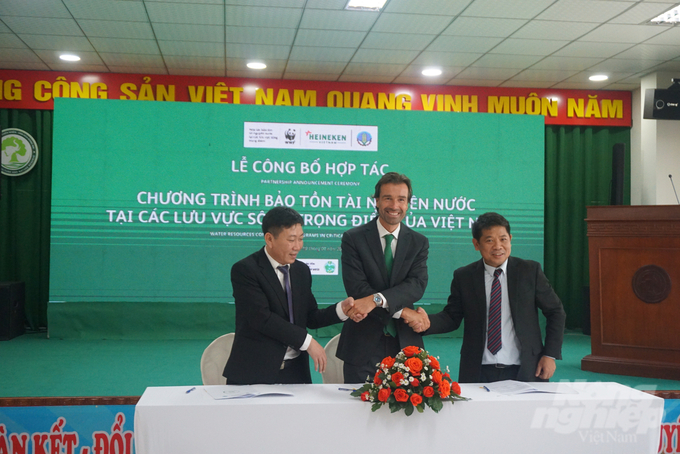
The Ministry of Agriculture and Rural Development, WWF-Vietnam, and Heineken Vietnam signed a Memorandum of Understanding on cooperation in the program of water conservation in key river basins of Vietnam. Photo: Nguyen Thuy.
The Ministry of Agriculture and Rural Development, WWF-Vietnam, Heineken Vietnam and local governments have recently launched a cooperation program to restore water resources in the Red River, Dong Nai River and Tien River basins on August 19. The program aims to restore water resources, ecosystem integrity and biodiversity, strengthen water resource control in key river basins of Vietnam.
The cooperation program of "Conserve water resources in Dong Nai Nature - Cultural Conservation Area, Dong Thap Muoi Ecological Conservation Area, and Xuan Son National Park in Tien Giang province" will be implemented for a duration of 4 years with a total budget of 30 billion VND, funded by Heineken Vietnam.
These are localitites with high biodiversity conservation value as well as high socio-economic value. However, the overexploitation of water, forest and land resources along with the ineffective management of waste treatment and the impacts of climate change have caused the local water resources to be reduced in quantity and degraded in quality.
According to the program schedule, the ecosystems in the key watersheds of these river basins will be restored through various solutions, improving the ability to regulate and supply water to the community and other agricultural and production activities in the lower reaches of these key river basins.
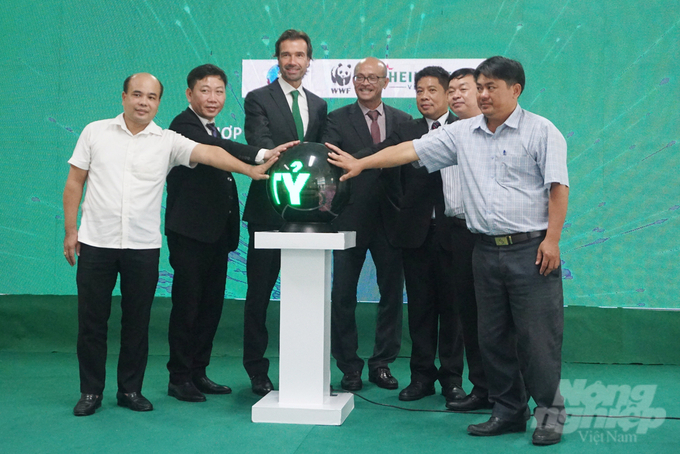
Representatives from the Ministry of Agriculture and Rural Development, WWF-Vietnam, Heineken Vietnam, Dong Nai Dong Nai Nature-Culture Conservation Area, Dong Thap Muoi Ecological Conservation Area and Xuan Son National Park officially launching the program. Photo: Nguyen Thuy.
The goal of the program is that the key freshwater ecosystems of Dong Nai Nature - Culture Conservation Area, Dong Thap Muoi Ecological Conservation Area, and Xuan Son National Park will be restored and protected by 2025. Communities in the region will establish new habits in daily life and activities that help to protect, restore and save towards the goal of conserving 3 billion liters of water annualy for the environment as well as production and daily activities in the lower reaches of river basins.
It is expected that the program will bring nearly 2 billion liters of water each year through nurturing and enriching activities over 1,100 hectares of natural forests in all three river basins; 200 million liters of water per year from new planting activities; 32.3 hectares of large timber forests and native trees will be added; 800 million liters of water will be compensated each year in Dong Thap Muoi Ecological Conservation Area through research and application of a suitable hydrological regulation and management plan.
In addition, communities living in the core and buffer zones of the Dong Nai Nature - Culture Conservation Area and Xuan Son National Park will be trained to jointly change their lifestyles and production habits in order to reduce impact on water resources, participate in activities of planting and preserving forests.
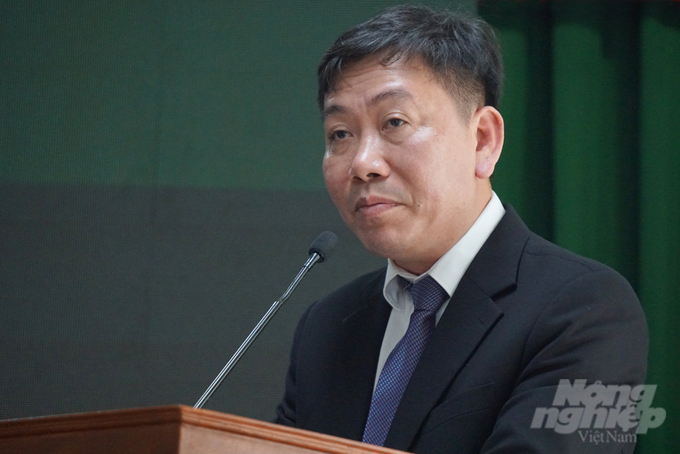
Mr. Nguyen Do Anh Tuan, Director of the International Cooperation Department, Ministry of Agriculture and Rural Development. Photo: Nguyen Thuy.
According to Mr. Nguyen Do Anh Tuan, Director of the International Cooperation Department, Ministry of Agriculture and Rural Development, the Vietnamese Government and governmental agencies are very interested in the development, conservation and improvement of water resources. Namely, the recent Project on Water Security has been submitted to the Politburo by the Ministry of Agriculture and Rural Development for approval. The story of creating water sources, water circulation, and water conservation have inspired the efficient use of water resources in both quantity and quality.
Mr. Tuan highly commended the program to restore water sources for Red River, Dong Nai River and Tien River. This is an important project in the general cooperation program on agricultural development in association with natural resource conservation; which was signed between the Ministry of Agriculture and Rural Development and WWF on February 14, 2022.
"This is a small-scale engineering project that has a very positive impact and value to raise public awareness as well as create clean water sources for residents, business households and businesses. The goal is to achieve sustainable development in addition to conserving natural resources, conserving water sources as described under the recent Project on Water Security by the Ministry of Agriculture and Rural Development has submitted to the Government for approval", said Mr. Nguyen Do Anh Tuan.
Mr. Tuan also highly regards Heniken's sense of responsibility when conducting business in Vietnam, which can be a good model for other domestic and foreign businesses in Vietnam to follow.
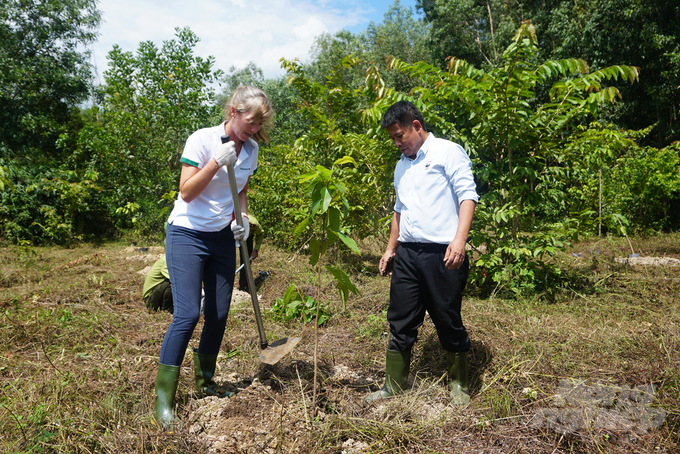
Ms. Holly Bostock, Senior Foreign Affairs Director of Heineken Vietnam and Mr. Van Ngoc Thinh, Director of WWF - Vietnam planting trees at Dong Nai Nature - Culture Conservation Area. Photo: Nguyen Thuy.

Mr. Doan Thanh Tam, Deputy Director of Dong Thap Muoi Ecological Conservation Area planting trees at Dong Nai Nature - Culture Conservation Area. Photo: Nguyen Thuy.
This event marks the determination and commitment of the stakeholders in an effort to restore water sources, contribute to ensuring a safe and healthy living environment for residential communities, raise awareness of good habits for the community as well as a sense of responsibility to conserve and cherish natural resources.
Mr. Hoang Viet, Water Program Manager of WWF-Vietnam, said that the program is designed with an integrated approach to address water security issues based on natural solutions and the community.
“With the strong commitments and close cooperation of the International Cooperation Department, the Department of Water Resources Management, the General Department of Irrigation, the Department of Special-Use Forests, the General Department of Forestry under the Ministry of Agriculture and Rural Development and local governments, along with the active support from Heineken Vietnam in this cooperation program, WWF-Vietnam believes that the key freshwater ecosystems of Vietnam will be protected and developed sustainably, contributing to increasing water supply for humans and nature, in the context of increasing water shortages in the lower reaches of rivers, especially in the dry season.
The implementation of this cooperation program will provide lessons for businesses to participate in the protection of water security, which can serve as a long-term support for their business activities as well as the interests of the community", Mr. Viet said.
Translated by Nguyen Hai Long

(VAN) Data from 10,000 farming households will help professionalize production organization and support the implementation of the One Million Hectares Program for High-Quality, Low-Emission Rice Cultivation.

(VAN) FAO Director-General QU Dongyu marks International Day of Plant Health at NENA conference.

(VAN) Deputy Minister of Agriculture and Environment Hoang Trung affirmed that floriculture and ornamental plants are a growing industry that receives significant global attention.

(VAN) The three staple crops dominating modern diets – corn, rice and wheat – are familiar to Americans. However, fourth place is held by a dark horse: cassava.
/2025/05/10/4037-3-223011_495.jpg)
(VAN) Remote sensing technology is becoming an indispensable tool in monitoring resources, developing modern agriculture, and protecting the environment in Vietnam.
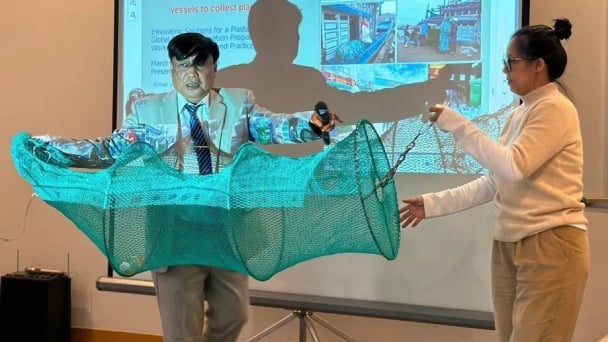
(VAN) The trash bag used on fishing vessels can withstand rough sea conditions, including level 8 to level 10 winds and waves. Notably, it can be hung anywhere on the boat.
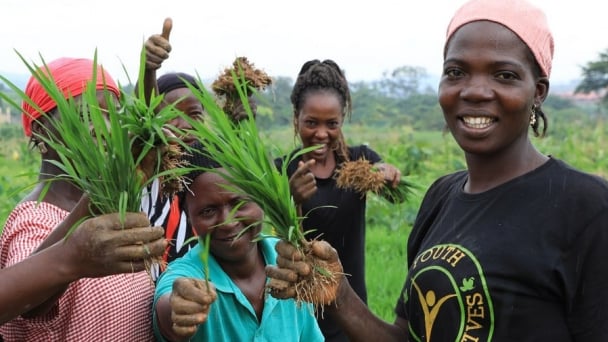
(VAN) African leaders launched the Kampala Declaration on Building Resilient and Sustainable Agrifood Systems in Africa, marking a bold step toward transforming the continent's agriculture.